[Interview] Chrust: ‘Tempo’ and their adventure towards Poland's 2025 Eurovision selection
In this interview, Chrust (made up of Małgorzata Oleszczuk, Karol Konop and Dariusz Mrozek) talks about their background, their influences and the birth of their musical project. With a genuine artistic approach and a desire to break down musical boundaries just a few days away from the final, they talk about their track Tempo which will be competing in the Poland national selection on 14 February!
![[Interview] Chrust : 'Tempo' et leur aventure vers la sélection polonaise 2025 pour l'Eurovision 1 chrust fb](https://www.eurovisionandfriends.com/wp-content/uploads/2025/02/chrust_fb-1024x546-jpg.avif)
Can you introduce yourself and tell us about the origins of your group?
I'm Karol Konop, member of the group Chrust, a musical project born of the desire to fuse modern and traditional influences, while exploring electronic and organic sounds. The group was formed with Dariusz ‘Darek’ and Malgorzata. We began our collaboration after realising that we shared a common vision: to produce music that could rival the best international productions while highlighting the Polish soul.
The starting point was also a kind of frustration: although Poland has talented producers, there is sometimes a lack of projects that reach an international audience. So we wanted to create music that could reach beyond our country's borders, while remaining rooted in our Polish cultural and musical roots. This led to the birth of Chrust, an ambitious musical project in which we are constantly seeking to explore new horizons.
How did you get started in music and why did you decide to embark on this adventure?
The group's journey began in a rather personal and emotionally difficult context. At the time, I was going through a pretty dark period, I was in a depression, without really understanding what was happening to me. Darek was also going through a major break-up. We met at a time when each of us was facing our own challenges. These moments of loneliness and despair paradoxically became a form of creative inspiration.
We got together mainly to discuss and exchange ideas about music, but also to support each other. It was in this collaborative, almost therapeutic state of mind that the band came into being. Originally, our music was a mix of experimental electronic sounds, with heavier, more ambitious touches to capture those raw emotions. We decided to create something authentic that would speak to our own experience, but also to others who might relate to it.
Quelles sont vos influences musicales, et comment ont-elles façonné votre son ?
Our influences are varied and come from different musical worlds. For Darek, there's a strong influence from bands like Tool and Wardruna, who are deeply rooted in natural and mystical sounds, often associated with elements of Scandinavian culture. He also loves the intensity of music that combines electronics and tradition in an organic way.
For my part, my influences come mainly from progressive rock and metal, genres I listened to a lot when I was younger. I've always been attracted to bold projects like Nine Inch Nails, not least because of the way Trent Reznor manipulates sounds and creates dark, experimental atmospheres. In the field of electronic music, I've also been inspired by producers like Justice and Deadmau5, who are major figures on the global electro scene.
These influences have played a crucial role in shaping our sound. We like to mix elements of electronic and experimental music, while incorporating a more organic and sometimes mystical dimension, which makes our tracks rich and dense.
In fact, the way we compose reflects this spirit. We have a collaborative, self-taught approach. We were invited to play at the A to Jazz Festival in Sofia, and on the programme our style was listed as ‘folk’ with a question mark. It made us smile, because we often defy musical categories.
At the same time, Małgorzata started teaching singing at a school run by Darek, who runs a small public school for drummers and musicians in Gdańsk. That's where we met and started making music together. For the last three years, we've been managing everything ourselves: composing, producing, writing lyrics and music. With no label or management, we follow our own path and see where it takes us. Each of us brings our own personal touch while respecting the style of others, which allows us to create a unique and sincere universe.
![[Interview] Chrust : 'Tempo' et leur aventure vers la sélection polonaise 2025 pour l'Eurovision 2 tempo chrust cover](https://www.eurovisionandfriends.com/wp-content/uploads/2025/02/tempo_chrust_cover-1024x576-jpg.avif)
How did the song ‘Tempo’ come about, and what was the creative process behind it?
‘Tempo’ is a song that was written over a period of almost a year, but only really found its meaning after a while. The lyrics were written by Darek, who at the time was working as a border guard between Poland and its neighbours. It was a time of migration crisis in Europe, and Darek spent his nights alone at the border, in the middle of nowhere, with plenty of time to think.
The lyrics were born in this environment: Darek was immersed in a feeling of confusion and doubt about his life choices, but also about existential questions. He wrote these words as a form of catharsis. However, for a year, these words remained in a drawer. We tried to use them several times in a song, but it didn't work. Then, at the end of last year, after watching Eurovision online between our concerts, we found ourselves in a hotel room commenting on the show. We noticed that one of our friends was also watching and posting stories on Instagram. We started chatting to him. He's a talented composer, and as a joke, we made a fictitious image of us taking part in Eurovision. This image was our most reactive publication on social networks.
This prompted us to go back to the lyrics, discuss them with him and finally give it a go. Against all odds, a few months later, we received a call telling us that we had been selected from all the applications, then in the top 25, then the top 15, and finally in the final 10. We didn't really think it would happen, but it was an incredible experience.
What was the inspiration behind the video for ‘Tempo’?
The song has a double meaning: on the one hand, it speaks of the complexity of life choices, but also of that inner dilemma that everyone experiences at one time or another. The melody and atmosphere have been constructed to amplify this idea of confusion, quest and resistance in the face of uncertainty. It's a song that touches us deeply, both emotionally and intellectually.
And the clip for ‘Tempo’ reflects the essence of the song, that sense of being in an ‘in-between’ - neither completely in the light nor completely in the dark. The idea was to show a person, a woman, who is looking for a form of redemption, but who finds herself hindered by invisible obstacles. These obstacles are symbolically represented by ribbons that encircle her, giving a visual image of the inner struggle we feel when faced with difficult decisions.
The figure of the woman in white in the clip symbolises art and the ideal, but also the weight that this can represent, the aspiration towards something unattainable. We wanted to show this duality: on the one hand, the desire to break free, to get rid of these shackles, and on the other, the fear of loss, of breaking away from what ties us to our ideals. The clip is not intended to provide answers, but rather to raise questions and allow for open interpretation.
I produced and directed this video myself. We did everything ourselves today. I don't like to explain things too much, because as David Lynch said, ‘art speaks for itself’. I think that's the most important thing: to open it up to interpretation. The aim was to make something that followed a precise idea while leaving room for everyone to draw their own meaning from it.
I'm happy to see that it's working, because the comments on YouTube are really wonderful. That's what counts for me. Even if I'm not totally happy with the technical choices, like the filters and the colours, I think I've managed to open the door for people to find their own interpretation.
![[Interview] Chrust : 'Tempo' et leur aventure vers la sélection polonaise 2025 pour l'Eurovision 3 chrust videoclip](https://www.eurovisionandfriends.com/wp-content/uploads/2025/02/chrust_videoclip-577x1024-jpg.avif)
Why did you choose to sing in Polish for ‘Tempo’?
The choice of singing in Polish wasn't driven by any strategic thinking about Eurovision or a specific audience. When we created the song, we simply wrote what came naturally. Darek, being Polish, felt the need to use his mother tongue to fully express his ideas and emotions.
Initially, there was no particular intention of writing for a competition or aiming for an international audience. However, the fact that the song has struck a particular chord with Poles and that it has received positive feedback in our country shows that there is something authentic and sincere in this approach. Polish has a particular emotional power that gives the song a kind of intensity and depth that we don't think could be conveyed in the same way in English.
We've always wanted to be true to our cultural identity, and singing in Polish was the best way to do that, without having to conform to a standard imposed by the music industry.
Are there any special Eurovision moments you'd like to share?
I don't really have precise memories, but I remember when Eurovision in Poland was a real event. It was like a national sport, everyone watched, even those who weren't football fans. Then there was a decline, I don't know if it was because of Eurovision in general or just Poland, but we saw songs that were more jokes than serious music. Recently, though, I think it's improved. One song I particularly liked last year was Nemo. I don't even care if he won or not, for me he was technically the best. His ability to sing and move at the same time, with such precision, was incredible. For me, it was a real feat, especially as someone who also has experience in theatre, I know how difficult it is to make coordinated movements while singing. It was really impressive.
Are you ready for the final next week?
Yes, I'm ready! We are ready. I see the comments, there are people who doubt (about Małgorzata Oleszczuk's voice), but she has already sung this song live, last week she sang live and she was ill. There's nothing to worry about, she's got a great voice and she'll be able to handle anything. With her and Derek, we're going to have fun on stage, that's the main thing.
Is there anything you'd like to say to our readers before next week's show?
Well, you know, there's a lot of Polish art that's migrated to Paris, and I realised the influence that had, like with iconic figures like Skłodowska (Editor's note: Marie)-Curie or certain Polish artists of the 90s. They became major inspirations for me, and it really shaped my vision of art and life. I have friends and family in France, I spent time in Lyon and Paris, and I really enjoyed it.
For Eurovision, I don't like convincing people to vote for Chrust. What I want is for everyone to watch the show and vote for what they really like. The art will stand up for itself. If it moves you, that's what counts. Just listen to your heart and vote for what you think is right. It's as simple as that!
Thank you to Karol Konop for this interview.
Entry Details - Chrust
Instagram Profiles Chrust ; Małgorzata Oleszczuk ; Dariusz Mrozek ; Karol Konop
![[Interview] Chrust : 'Tempo' et leur aventure vers la sélection polonaise 2025 pour l'Eurovision 4 YouTube player](https://i.ytimg.com/vi/5MS8Dy1z7Yc/maxresdefault.jpg)
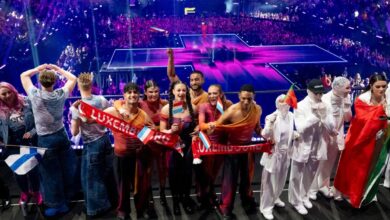
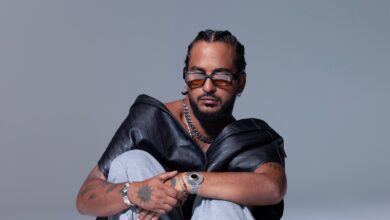
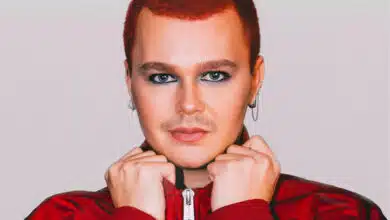
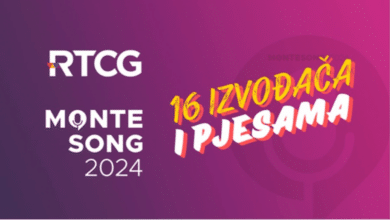
![[Interview] Shkodra Elektronike: from their victory at the Festival i Këngës to Eurovision 2025 9 Shkodra Elektronike - Instagram credit @shkodraelektronike](https://www.eurovisionandfriends.com/wp-content/uploads/2025/02/Shkodra-Elektronike-220x150.jpg)
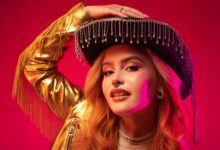
![[interview] "Show Me What Love Is" : Erik Segerstedt se confie avant la finale du Melodifestivalen 2025 11 Erik Segerstedt](https://www.eurovisionandfriends.com/wp-content/uploads/2025/03/Snapinst.app_476146067_18481611481053861_7687929393356749059_n_1080-220x150.jpg)